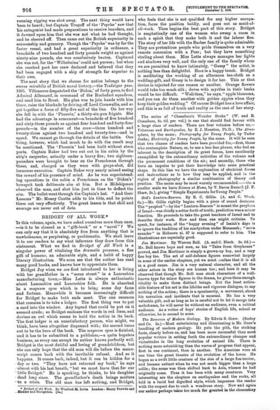BRIDGET OF ALL WORK.*
'Is this volume, again, we have asked ourselves more than once, —is it to be classed as a " gift-book " or a " novel" ? We can only say that it is absolutely free from anything that is unwholesome, or perplexing, or problematic. We shall leave it to our readers to say what inference they draw from this statement. What we find in Bridget of All Work is a singular power of vitalising the dramatis personae, a fine gift of humour, an admirable style, and a habit of happy literary illustration. We soon see that the author has read -many good books, and knows bow to appreciate them.
Bridget Joy when we are first introduced to her is living
-with her grandfather in a "mean street" in a Lancashire -manufacturing town,—Miss Letts is always enthusiastic about Lancashire and Lancashire folk. He is absorbed in a magnum opus which is to bring some day fame and fortune. Meanwhile it becomes increasingly difficult Tor Bridget to make both ends meet. The one resource that remains is to take a lodger. The first thing was to put a card into the window. Any legend that could be put on it seemed crude; so Bridget encloses the words in red lines, and devises an owl which seems to bold the notice in its beak. The first lodger is an unsatisfactory person, who might, we think, have been altogether dispensed with; the second turns out to be the hero of the book. The magnum, opus is finished, and it has to be submitted to a publisher,—a quite hopeless business, as every one except its author knows perfectly well. Bridget is the most dutiful and loving of grandchildren, but she can only hope that the old man will die before the manu- script comes back with the inevitable refusal. And so it 'happens. It comes back, indeed, but it can be hidden for a • day or two. "They have not returned my book," he says :almost with his last breath, "but we must leave that for our ' little Bridget." He is speaking, he thinks, to his daughter dead long since. The grandfather's death brings matters - to a crisis. The old man has left nothing, and Bridget, • Bridget of AU Work. By Winifred M, Letts. London ; Henry Frowde and --Hodder and Stoughton. [53.]
who feels that she is not qualified for any higher occupa- tion, faces the position boldly, and goes out as maid-of- all-work. Then begins the best part of this story. Bridget is emphatically one of the women who sweep a room in such a spirit that they make both it and the labour fine. The story of her life with the Barber family is quite admirable. They are pretentious people who pride themselves on a very remote connexion with a Peer; but they have something sterling about them. Miss Letts always manages her lights and shadows very well, and the only one of the family whom we are permitted to know intimately, " Gassy " the artist, is nothing less than delightful. Here is a happy touch. Bridget is meditating the working of an afternoon tea-cloth as a wedding-gift, and Gussy is to design it for her. This or that device is rejected for one reason or another. Orange flowers would take too much silk ; doves with myrtles in their beaks would be too difficult. "Well then," he says, "apple blossoms, and you can do them another with golden apples when they keep their golden wedding." Of course Bridget has a love affair, and this is as full of truth and reality as the rest of her story.






































































 Previous page
Previous page